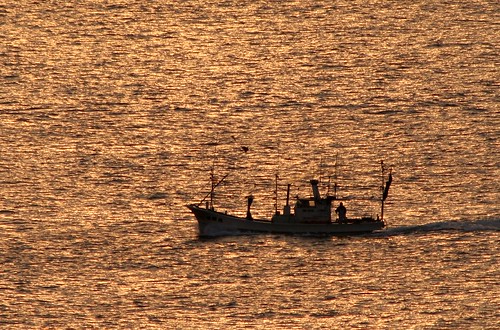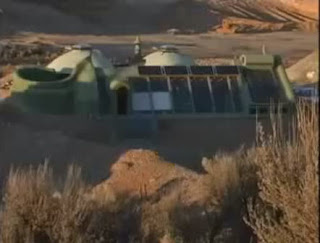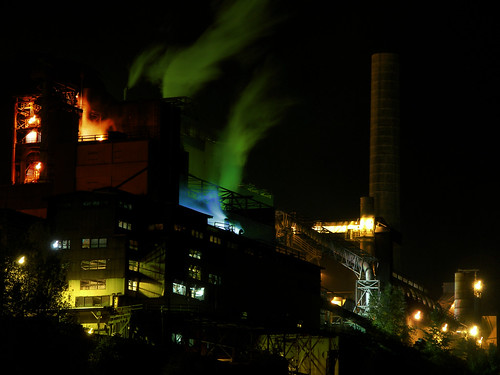Saturday, June 30, 2007
Friday, June 29, 2007
Green Home Environmental Store
 This was a helpful website. They have done a nice job of compiling a lot of products that are available for greening your life style.
This was a helpful website. They have done a nice job of compiling a lot of products that are available for greening your life style.The Sustainability Revolution

What are the commonalities that are found across the different groups that are the players behind the sustainability movement? This is a philosophical look at what is the driving force that is bringing these people and groups together.
Featured on: Green Hour
More Interviews (Link)
Wednesday, June 27, 2007
Disney is one road block to eco awareness in Orlando
I believe that some of the first groups to help bring innovative ideas to the market place are artist and musicians. They are often on the leading edge of change. In Orlando we have Disney and Disney pulls all of the talent toward it, like a giant magnet. Why create small entrepreneurial art venues to showcase people's talent when you can go and perform at Disney? Any local endeavor is always competing with Disney. Disney is the ultimate place to perform. Getting to perform at Disney is a big incentive and make it difficult to permute that arts locally.
Orlando has Mickey Mouse as its soul which robs our city of the diversity in the arts that it could have because we are over shadowed by the Mouse. Disney soaks up all of the creative energy that would otherwise thrive in our community. This impacts so many other areas of our fair city, and stifles innovation indirectly. That is one reason I think we are so far behind and in most cases, totally clueless about the environmental milestones that are being crossed all over the globe.
Monday, June 25, 2007
Innovative ways to help people buy local

I'm also looking forward to Whole Food's new store in Orlando. They will have one day each week where local farmers can bring their produce to the store and there will be a farmer's market right in the parking lot of Whole Foods. Whole Foods will get a percentage of the sale for the products sold. What a terrific idea too.
Two good examples of how to buy local.
Sunday, June 24, 2007
Are we making progress? Just more hot air about going green in the US
For the record, let's see where we stand with Washington:
1. The Senate bill that calls for a 35 miles per gallon standard to be met by 20 is now making its way through the House. But the bill provides a loop hole given by the Transportation Department that gives provides an "opt out" option for US car manufacturers who cry and say it's too expensive to meet this standard.
The European Union is already at 35 mpg today and is competing with Japan to get to 40 mpg soon by 2012.
Freidman calls our policy: "assisted suicide for the U. S. auto industry."
2. The Republicans killed a proposed national renewable electricity mandate that would have required utilities to produce 15 percentage of our power from wind, solar, biomass and other clean-energy sources by 2020.
3. Republicans killed the Democrats' effort to boot taxes on oil and gas companies that would have raised some $32 billion for alternative fuel projects.
4. There was no attempt to even discuss the cap-and-trade system for taxing carbon dioxide emissions. They also killed the effort by Senator Amy Klobuchar of Minnesota to design a carbon counter.
Saturday, June 23, 2007
Walls of Death?

Thursday, June 21, 2007
Green School Buses


Wednesday, June 20, 2007
Why I love Starbucks--The Planet Game

Monday, June 18, 2007
What is an eco-friendly lifestyle?
Here are the things that my husband and I do so far. I drive a Prius, am a vegetarian, recycle, use cloth grocery bags, use cosmetics that have not been tested on animals, turn off lights when not in use, educate myself about environmental issues, write letters to my representative, give money to candidates that I believe care about the same issues I care about, talk to people when ever I can about the environment, have a blog and run a book club to encourage others to read.
We have lots and lots of plants in our yard that my husband has planted which helps absorb carbon. We have a natural area in the front of our house and on both sides that provide a natural habitat for many of the critters who are native to Florida. My husband volunteers for an animal rescue organization and we foster Labrador retrievers who are looking for a home. I try to purchase green cleaning supplies and consumer products that are manufactured or produced in eco-friendly ways.
Are there more things we could be doing? I'm sure there are. Economics factors into the picture. Right now it would be to expensive to retro-fit our house for solar.
What are some things eco-friendly things you do to live green and eco-friendly?
Sunday, June 17, 2007
Gopher Tortoise Rescue


Friday, June 15, 2007
The Myth of the Golden Toad
 Photo: National Geographic
Photo: National GeographicChinese Tiger Farms
 Photo by: National Geographic
Photo by: National GeographicWe are changing the rich tapestry of life on this planet...

This is right off their webiste and summarizes what was in the first half of Tim Flannery's book, "Weather Makers." There are all kinds of interesting reports that cover topics like How to Sustain Life on this Planet and the Web of Life.
"The rich tapestry of life on our planet is the outcome of over 3.5 billion years of evolutionary history. It has been shaped by forces such as changes in the planet's crust, ice ages, fire, and interaction among species. Now, it is increasingly being altered by humans. From the dawn of agriculture, some 10,000 years ago, through the Industrial Revolution of the past three centuries, we have reshaped our landscapes on an ever-larger and lasting scale. We have moved from hacking down trees with stone tools to literally moving mountains to mine the Earth's resources. Old ways of harvesting are being replaced by more intensive technologies, often without controls to prevent over-harvesting. For example, fisheries that have fed communities for centuries have been depleted in a few years by huge, sonar-guided ships using nets big enough to swallow a dozen jumbo jets at a time. By consuming ever more of nature's resources, we have gained more abundant food and better shelter, sanitation, and health care, but these gains are often accompanied by increasing environmental degradation that may be followed by declines in local economies and the societies they supported."
In good company, THOMAS FRIEDMAN agrees with me!
Our Green Bubble
By THOMAS FRIEDMAN
Surely the most glaring contrast in American political life today is the amount of words, speeches and magazine covers devoted to the necessity of “going green,” “combating climate change” and gaining “energy security,” and the actual solutions being offered by our leaders to do any of these things. You could very comfortably drive a Hummer through the gap between our words and deeds.
We are playing pretend — which, when you think about it, is really troubling. Here are the facts: Our worst enemies, like Iran, have been emboldened by all their petrodollars. The vast majority of scientists tell us that global warming caused by our burning of fossil fuels is a real danger. And with three billion new consumers from India, Russia and China joining the world economy, it is inevitable that manufacturing clean, green power systems, appliances, homes and cars will be the next great global industry. It has to be, or we will not survive as a species.
And yet ... and yet our president and our Congress still won’t give us an energy bill that would create the legal and economic framework to address these issues at the speed and scale required.
If you were President Bush, wouldn’t you want to leave behind something big, bold and important on energy, just in case — you know, just in case — Iraq doesn’t turn out so well?
I sure would. But the president still has not challenged Congress or the country to undertake a radical departure on energy. So we still have only “energy politics,” not “energy policy.” Like previous energy bills, the packages working through the House and Senate today represent more “the sum of all lobbies,” as the energy expert Gal Luft, co-chairman of the Set America Free Coalition, puts it, not the sum of our best ideas.
Some lawmakers are pushing corn ethanol from Iowa, either because they hail from that area and are looking to give more welfare to farmers by wasting money on an alternative fuel that will never reach the scale of what is needed, or because they plan to run in the Iowa caucuses. Others are pushing huge subsidies to turn coal into gasoline, because they come from coal states. Those who don’t come from Michigan want higher mileage standards imposed on Detroit, while those who come from Michigan prefer to continue their assisted suicide of the U.S. auto industry by blocking tougher mileage requirements.
“The only green that they are serious about in Congress right now is the one with Ben Franklin’s picture on it,” Mr. Luft said.
Yes, it is helpful that Mr. Bush expressed a desire last week to work with other nations to limit greenhouse gases. His bully pulpit matters. But no one will — or should — take him seriously unless his government first leads by example. What would that look like? It has to start with a clear, long-term price signal. That is, a carbon tax or gasoline tax — or a cap and trade system with a binding national ceiling on carbon dioxide emissions — which would set a price for dumping carbon into the atmosphere or driving a gas-guzzling car.
Get Washington to signal that gasoline is never going to retreat from a level of $3.50 or $4 a gallon — and that wind and solar subsidies will be there for a decade, not stop and start as they always have before; get Washington to commit to buying a fixed volume of solar and wind power for government buildings and Army bases for 10 years, with only U.S.-based manufacturers able to compete for contracts; get Washington to set a new fleet average of 35 miles per gallon for Detroit within 10 years — with no loopholes; establish government loan guarantees for any company that wants to build a nuclear power plant; and, finally, build a national transmission grid — a green power superhighway — so that solar energy from Arizona or wind from Wyoming can power homes in Chicago. Do all that and our private sector will take America from green laggard to green leader.
Unfortunately, Congress is brewing instead a hodgepodge of incrementalism. This is particularly disappointing when America’s corporate icons — G.M., G.E., A.I.G., DuPont, PepsiCo — “have all come out in favor of a national mandatory limit on carbon emissions,” notes Fred Krupp, president of Environmental Defense. “But Democrats and Republicans in the Senate have not risen to their challenge.” (AMEN)
We have a multigenerational problem that requires a systemic, multigenerational response, and that can happen only if we get our energy prices right. Only that will guarantee green innovation and commercialization at scale. Anything less is wasted breath and wasted money — and any candidate who says otherwise is only contributing to global warming by adding hot air.
Where have the real leaders gone?
I am so discouraged. I have spent a week scouring the Internet, looking for real solutions for moving the planet away from “business as usual” to a more healthier and sustainable way of life. I’m looking for business champions that are helping people lower their carbon footprint, providing a way of reducing the chemicals we use every day and helping us find a better way to live on this planet
I see small groups of people trying to make a difference. But it is difficult to find publicly traded companies that are profitable and making their shareholders happy while producing goods and services that are not impacting the planet in a negative way. There are a few, but there are not nearly enough to make the difference that needs to be made in the amount of time we have to do it. This is why I believe it is the responsibility of governments to jump-start the process. Businesses are out there, risking everything with little assurances that the market will reward their efforts. Most people are not even aware of the real dangers that we face because they have been lied to by groups that have paid million of dollars to cloud the issues with media propaganda.
I think the neo-conservatives are wrong, wrong, wrong! Their idea is economic Darwinism, the strongest survive. They don’t care who wins or looses, its part of the natural law, they argue! I just don’t see how the momentum will change without a push from governments. And right now our government believes is laze-faire and would rather spend billions of dollars on a war for oil, than billions of dollars on finding a way to free ourselves from our dependency on foreign oil. It is the government’s responsibility and they are not leading our country in the right direction! That is for sure!
How can this be good?
Our atmosphere is the great aerial sea. The carbon in the air causes light waves to turn into heat waves. The heat from the atmosphere takes thirty ears to transfer to the oceans. The temperatures of the oceans are the result of the carbon that was in the atmosphere thirty years ago. We have used more carbon fuels in the last 20 years than we used in the prior 180 years. We will not know or see the result of that carbon until 2040 to 2050. I will most likely be dead by them. It will be my children and my grandchildren that will live with what our society is doing in this decade and beyond. How can anyone say it does not matter?
Thursday, June 14, 2007
Heal Our Oceans... Heal Our Planet...

Who wins if we do nothing? Really? The IPCC calculated the cost of dealing with Global Warming and decided that it was just too expensive. They calculated the value of a poor person's life vs. a rich person's life. Economist concluded that a poor person’s life was worth 1/8th of the value of a wealthy person’s life. (How they figured this one can only image. I am assuming it had to do with productivity and overall benefit to the economy. ) When I hear groups trying to diminish the eco-global warnings and the alarms bells that are sounding everywhere, I have to wonder who benefits by trashing this message?
It makes me think of Dr. Frank Luntz who said that he didn't like "environmentalist" because they were, "mean people." He said polar bears were the "poster child" of the environmental movement; before that it was the "spotted owl." He shrugged it off as though it was a ploy to gain political support for the Democrats. And that's the problem with their way of thinking, it's all about profits, power, greed, dominance and he who has the most toys wins.
I am really, really fearful. I'm fearful that they will win and that they will convince everyone not to take the threat of global warming seriously. I’m afraid that the media will continue to ignore the issues and that we will reach a tipping point when it becomes impossible to change. I hope and pray that we do not let that happen. Only time will tell...
Leonardo DiCaprio Foundation's Eco Movie about Water
Leonardo DiCaprio Foundation has actively fostered awareness of environmental issues through participation with such organizations as Natural Resources Defense Council, Global Green, USA, the International Fund For Animal Welfare, and National Geographic Kids.

He also has one on Global Warming! Please watch!
His offical website for environmental issues: Leonardo Dicaprio
Monday, June 11, 2007
Impact of climate change on the most fragile

I love organizations like these. I can't understand how the "moral majority" can not see that our abuse of the planet will in the end, bring much pain and suffering to those we were supposed to protect...
In the end.. .the only thing that will matter is the environment.
Sunday, June 10, 2007
Florida is the Backwaters of Environmental issues
Friday, June 08, 2007
Where have all the animals gone?
A world with no tigers

Tiger in Bushes, originally uploaded by babasteve.
Reuters reported that tigers are on the path to extinction. "The world's wild tigers are on a "catastrophic" path to extinction as numbers continue to decline because of increased poaching, habitat destruction and poor conservation efforts by governments, a new report has said." Can you imagine a world with no tigers? There is no where for these creatures to live...
Solar Energy in Africa
Thursday, June 07, 2007
Learning to live Green



After reading "Weather Makers" by Tim Flannery, I have decided to really try to figure out what else I can do to make my footprint on even Earth smaller. I am going to look for more ways to reduce my output. So far I drive a Prius, am a vegetarian, recycle, use cloth grocery bags, use cosmetics that have not been tested on animals, turn off lights when not in use, educate myself about environmental issues, write letters to my representative, give money to candidates that I believe care about the same issues I care about, talk to people when ever I can about the environment, have a blog and run a book club to encourage others to read.
But I know now it is not enough. I need to do more. So I’m looking for ways to be even Greener. Here is something I had not thought about: buying toothbrushes that are made from recycled plastics. Here is a company and a list of retailers who carry the product. I will add this to my list of things I can do to make a difference. I read that in the US we throw away 300 million toothbrushes a year. That may seem small but if you have to consider the cost of extracting raw materials vs. the cost of energy in recycling the product. The amount of product that is saved from the landfills, the cost of building and maintaining landfills as well as the environmental impact of the landfills it changes the equation. I haven’t sat down and done an analysis of this in detail, but I’m making the assumption that buying a toothbrush from recycled plastics is better overall in many ways. My next toothbrush will be green.
Here are two places I found that have toothbrushes made from recycled materials. They also have store locators:
Wednesday, June 06, 2007
Good ideas for CONSERVING WATER

--Repair leaky faucets. Just one drip per second wastes 20 gallons per day.
--Check your toilet for leaks. Put 10 drops of food coloring in your toilet tank. If the color begins to appear in the bowl after 20 minutes without flushing, you have a leak that could be costing you 200 gallons per day. Repair parts are cheap and easy to install.
--Turn off the water while brushing your teeth, shaving, or washing your face. Faucets spout 2-3 gallons per minute. Also, try installing an inexpensive faucet aerator to reduce the flow.
--Take shorter showers. Showers use 5 to 10 gallons per minute. Consider buying a low flow shower head.
--Put a plastic bottle in your toilet tank. If you do not own a low flow toilet, fill a plastic bottle with water or sand and place it in the tank of your toilet where it will not interfere with the operating mechanisms. This will decrease the amount of water used with each flush.
--Run the washing machine and dishwasher only when full. If you have to wash a partial load, adjust the water level settings accordingly and avoid the permanent press cycle, which uses an extra 5 gallons. If you are buying a new appliance, consider a water-saving front load washer.
--Don't let the water run while washing dishes.
--Fill up the sink basin or a large bowl for washing and run the faucet at a low level for rinsing.
--Turn off the water while you wash your car.
--Use a bucket instead and save over 100 gallons.
--Water your lawn only when it needs it. If the grass springs back up after you step on it, it doesn't need water. Try to water during the cool parts of the day and avoid watering when it is windy.
--Use recycled water for your houseplants. Save the leftover water from boiling eggs, washing vegetables, etc.
Monday, June 04, 2007
Conscious Creative
Afghanistan: Are women's rights growing because of the US?
Bush unveils climate strategy at the G8
Rainforest Thoughts 1990

Saturday, June 02, 2007
Earth Trends

Al Gore Action Agenda
2) Start a long-term tax shift to reduce payroll taxes and increase taxes on CO2 emissions.
3) Put aside a portion of carbon tax revenues to help low-income people make the transition
4) Create a strong international treaty by working toward "de facto compliance with Kyoto" and moving up the start date for Kyoto's successor from 2012 to 2010.
5) Implement a moratorium on construction of new coal-fired power plants that are not compatible with carbon capture and sequestration.
6) Create an "ELECTRANET" -- a smart electricity grid that allows individuals and businesses to feed power back in at prevailing market rates.
7) Raise automobile CAFE standards.
8) Set a date for a ban on incandescent light bulbs.
9) Create "Connie Mae," a carbon-neutral mortgage association, to help defray the upfront costs of energy-efficient building.
10) Have the SEC require disclosure of carbon emissions in corporate reporting, as a relevant "material risk."
Encyclopedia of Life
"There is a time when panic is appropriate response"

Global Warming--Discovery Channel and Weather Makers





Friday, June 01, 2007
antarctica
 I have learned so much about Antarctica reading Tim Flannery's book, "Weather Makers." He has opened my eyes to a world I barely knew. Here is a short overview of Antarctica from National Geographic.
I have learned so much about Antarctica reading Tim Flannery's book, "Weather Makers." He has opened my eyes to a world I barely knew. Here is a short overview of Antarctica from National Geographic. 





























